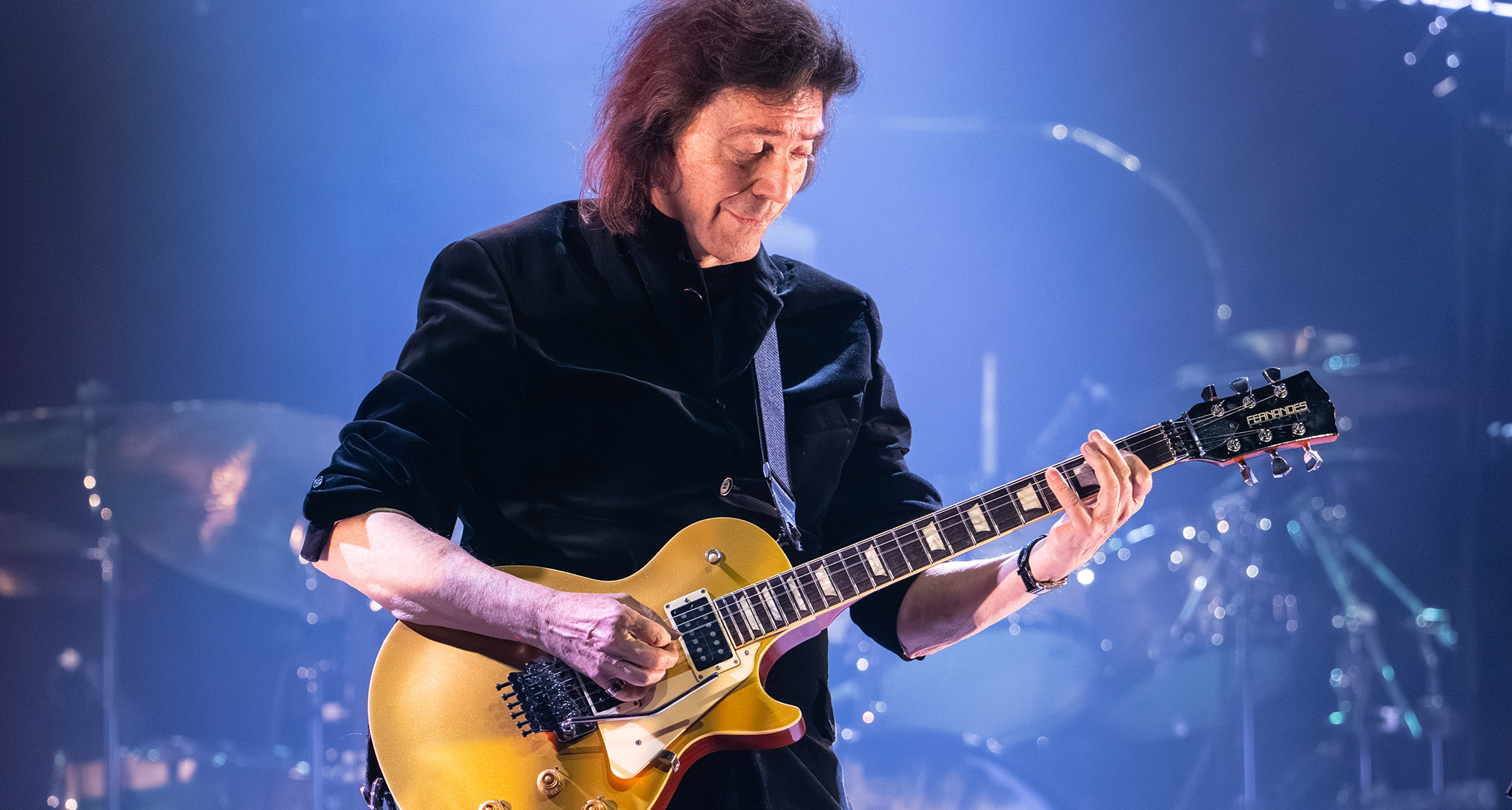Black Veil Brides: "We really hated the lead tones on that first album - it was exciting to go back and re-record it all"
Jake Pitts and Jinxx wax lyrical on technique, classical influences and completely re-recording the band's debut album, Re-Stitch These Wounds

"We’ve been discussing doing this since 2013," says Black Veil Brides lead guitarist Jake Pitts, when asked what prompted the Californian rock group to return to the studio and re-record their debut full-length, We Stitch These Wounds, in its entirety.
The release of the new version, titled Re-Stitch These Wounds, will also be marked by a live streamed set from LA’s legendary Whisky A Go Go venue, where the quintet will be performing the album in full.
Speaking to Guitar World from his home studio, joined by rhythm guitarist/violinist Jinxx - also from a home studio - the conversation soon turns to the reasons behind this re-imagination of their early songs...
"Honestly, 2013 wasn’t even that long - three years - after putting the debut out," continues Jake.
“We all felt the production was lacking a little bit, we weren’t able to fully portray what our vision was. So we started talking about at least having it remixed some day with a bigger production - and that sparked the idea of re-recording it for a 10-year anniversary thing. It probably didn’t make sense to re-record it earlier on, but now it did."
"It was all rushed and on a tiny budget," agrees Jinxx. "We had a much bigger vision for these songs and now we had the opportunity and knowhow to make it sound how it should have. It was definitely exciting to go back and re-record it all - that was the only way to make it sound how we wanted..."
What kind of amps were you using on the original recordings?
All the latest guitar news, interviews, lessons, reviews, deals and more, direct to your inbox!
Jake: "So I think it was a Marshall JCM800 - which is a great amp, it just wasn’t captured properly. There was a Mesa/Boogie Road King as well. We probably used a pedal for the leads, too.
We’ve been playing Kempers live since maybe 2011, we were one of the first bands to jump on that and we got a lot of crap for it. Now everyone uses Axe-FX or Kemper!
Jake Pitts
"I really hated the lead tones on that first album - it sounded so brittle and harsh. There was one pedal that helped get the kind of gain we needed, but I remember there was so much crazy feedback and fuzz. I had to use the volume knob almost like a gate. Listening back now, it sounds so nasty."
Jinxx: "I think he got better tones on the PODxt kidney bean for the original demos!"
Jake: "Yeah! So moving forward to the re-record, we didn’t use any amps at all. We’ve been playing Kempers live since maybe 2011 - we were one of the first bands to jump on that and we got a lot of crap for it. Now everyone uses Axe-Fx or Kemper!
"But I didn’t even do that, we recorded through the Axe-Fx to capture a DI and I ended up finding the sound through JST plug-ins or STL ones - I believe I used the Andy James 6505."
And what can you tell us about guitars used on both recordings?
Jake: "My 2001 Schecter Diamond Series C-1 Elite is what we recorded the first on. In fact, the first four records! Right now, I don’t know what pickups are in there… it might be a Het Set. But for the original recordings, it was two EMG 81s. Not much has changed, we still use those in the bridge.
"This time we used a Les Paul with the 81/85 set and an Evertune bridge, and then a hardtail version of my Schecter signature for the lead stuff. EMG send me all kinds of pickups, I’ve been trying out some of the passive ones, there are loads I haven’t had the chance to even try yet. But for some reason I always go back to the 81. It’s just my favorite."
Jinxx: "Same! For the most part, that first record was with Jake’s C-1. But I also had a guitar my buddy custom made for me with a Ouija board graphic. It was fun to play live and looked cool, but I have to say it wasn’t the greatest studio guitar.
"We might have tried it and then been like, ‘Naaaah!’ So that C-1 got used for the rhythms and leads. We wanted to keep everything really consistent for the re-recordings."
There was so much pressure in the studio originally, forced to do a solo on the spot. Re-recording everything, we could take our time with it all
Jinxx
Jake, it must have been really interesting revisiting some of the solos with an extra decade of experience and practice under your belt...
Jake: "Going back to all those solos, I wanted to see where I could spice things up a bit or make it all sound a bit more tasteful. I didn’t want to drastically change anything or totally rewrite them, so it was more about taking it to the next level and seeing if I could outdo myself.
"I just wanted to find some extra flair and add a few special or memorable moments in there. I think we pulled it off pretty well!"
Jinxx: "There was so much pressure in the studio originally, forced to do a solo on the spot. Re-recording everything, we could take our time with it all. I remember hearing some of my original rhythms thinking, ‘How the hell did I do this?!’ And it was the same for Jake relearning his solos."

It definitely feels like some of those leads were Paul Gilbert-inspired, with some pretty gnarly alternate picking runs...
Jake: "Definitely! I had all the Paul Gilbert DVDs, John Petrucci and more. Heaven’s Calling has a solo that’s very Buckethead-inspired, with this crazy finger-tapped thing going up the neck. It took me a while to sit and work out what I did, it felt really unusual.
"But that’s what made a lot of those early songs so special. We didn’t have any filters or rules. We didn’t have a major producer trying to make us fit into the mainstream - we were just doing what we thought was cool. That’s what brought a lot of magic to the record."
For some of the bridges and breakdowns I just ripped off Bach!
Jinxx
Jinxx: "We have such a wide variety of influences - it was obvious from when we started working together. Jake was more into Paul Gilbert and Buckethead, we both shared a love for Metallica, but I was more into the classical side - whether that be Marty Friedman or composers like Bach.
"That’s why there are these classical elements in there - for some of the bridges and breakdowns I just ripped off Bach! You might hear some Brandenburg Concerto in there - well I’d say it was more borrowed than ripped off.
"Heaven’s Calling is another classical-influenced riff. There were no rules, so we were throwing all our styles into it. We weren’t trying to make pop songs - we were just writing what we thought was cool."
So when exactly did your interest in classical music begin?
Jinxx: "I played violin in orchestras growing up, normally sat in the second violin section. I could hear first violins on my right, the violas and cellos on my left, playing Vivaldi or Bach or whatever.
"I’d hear these harmonies coming together, which really helped me appreciate which ones I liked the sound of. You have to distinguish the difference between intervals like minor or major thirds, fourths and fifths, and find creative ways of putting it all together.
"I also like dissonances from seconds and sevenths, too. You can get really complex with inversions and going between scales. I really like alternate progressions, where some of the parts are going up and some are going down.
"I like the idea of instruments trading, where a melody starts off somewhere and gets picked up elsewhere - like a back and forth conversation rather than everyone playing the same melody at the same time."
Even the riffs themselves are quite a workout for the picking hand...
I gotta give credit to Adam D from Killswitch and the guys in Unearth. That’s how I got into the more aggressive style of metal riffing
Jake Pitts
Jinxx: "I wasn’t much of an alternate picker at first, I was more into down-picking."
Jake: "I remember seeing him play and thinking, ‘That guy is crazy at down-picking!’"
Jinxx: "There was a band I played in before called Amen and everything was down-picking on a Les Paul and very aggressive. I guess that came from growing up loving Metallica - Hetfield was always a great down-picker.
"Jake got me more into alternate picking and I would say the key is going slow and steady. Work up to speed to ensure you remain consistent and stay on time. It took a while for me to get there…"
Jake: "A lot of my right hand technique came from playing along to Killswitch Engage’s The End Of Heartache and Unearth’s The Oncoming Storm. I literally learned both from front to back and all of those riffs need to be alternate picked.
"Then there are some where you are picking inside the strings, which is a bit of a crazy technique. Learning those two records developed my form and how I play. I gotta give credit to Adam D from Killswitch and the guys in Unearth. That’s how I got into the more aggressive style of metal riffing."

Considering how young the band was at the time, the music was incredibly detailed and orchestrated, as opposed to raw and pentatonic...
Jinxx: "With classical, everything tends to be diatonic. There is no pentatonic in classical, so those lines tend to take you on a journey that’s very interesting to the ear. I like the sound of Eastern scales - Marty Friedman, who I mentioned earlier, is incredible at fusing Eastern with classical.”"
Jake: "Sometimes a simple pentatonic line might be what the song calls for. But I think what got me out of the standard minor pentatonic stuff was listening to bands like Avenged Sevenfold. I got really into Synyster Gates’ arpeggio style, using five strings instead of two, and finding melodies within shapes you’d normally sweep.
"A lot of that came from Paul Gilbert, too. I remember when I first learned his fast string-skipping licks, people would tell me my sweeping was good and I’d have to explain I wasn’t actually using that technique.
My mom knew everything about harmony and theory. I would ask her things and she’d blow my mind. I learned a lot and in a different way from my shred heroes
Jake Pitts
"For anyone trying to step out of the pentatonic box, those licks will take you to another level. That kind of stretching will turn you into a better player in a short amount of time."
Looking back now, who do you think most influenced you into having a career in music?
Jake: "My mother was a huge influence on me. She played a lot of acoustic guitar but she was also a brilliant piano player. I actually have one of her pianos here. She passed away from a heart attack in 2014, but it was her who taught me about music.
"I’d be playing guitar and wondering how to play a harmony and she’d show me on piano. She taught me how to count up in semitones until you find your third or fifth… it’s not like I always know it. Sometimes I have to try and work it out, I play a lot more by ear and am not too great with the theory.
"But my mom knew everything about harmony and theory. I always call her a musical genius. I would ask her things and she’d blow my mind. I learned a lot and in a different way from my shred heroes."

And what about you, Jinxx?
Jinxx: "Again, I feel like I have to say it was someone in my family. We’re all pretty musical, my Dad can sing and play every single classic rock song, he can go for hours with an entire catalogue! My grandfather, who passed away in 2007, was a fiddle player.
"When I would go visit him, he would pull this violin from under his bed and start playing. It felt so different because I was brought up in a rock ’n’ roll family. When I was about seven I told my mom I wanted to learn violin and she was like, ‘Really?’ I guess it was my way of rebelling!
"So my grandfather gave me lessons and took me to watch the symphonies in Des Moines. He’d say if I got as good as the violinists there, he’d give me his violin. By the end of high school, I was playing in that symphony and he gave me that instrument. I’ve played it on all our records to date. Without him, I wouldn’t have picked up the violin or gotten into classical music."
If you play guitar, you should really get a computer with a cheap interface for 150 bucks and start recording your riffs
Jake Pitts
Jake, what’s your main piece of advice for all the budding shredders out there?
Jake: "Understand production. I’ve always been into recording, but especially in the last five years. If you play guitar, you should really get a computer with a cheap interface for 150 bucks and start recording your riffs. Writing your own songs is the most important thing as a musician.
"Of course you want to learn other people’s music and solos too, but within five months of starting, I was already writing. Creating your own art often gets overlooked. Why else do we pick up instruments?
"The technology is there now, you can record something that sounds amazing with just a laptop. So learn some basic recording techniques and you’ll start creating things you would never have imagined.
"Hearing it back also sparks your imagination for where you take it next. You don’t have to be great at it, even a crappy demo will take you somewhere. 10 years later, you might be producing a whole album!"
And Jinxx, what have you learned through all these years as a touring musician?
Jinxx: “The only thing I have to add to that is don’t let anybody discourage you. I was fortunate that my family encouraged me, but I wasn’t popular in school and I remember the first time I auditioned for a talent show, I had this little travel guitar like Michael J. Fox at the beginning of Back To The Future and everybody laughed at me.
"But when I started playing One by Metallica, the whole room shut up. I got made fun of, people were constantly telling me I wouldn’t get anywhere. Don’t listen to those people. If you become successful, people are still going to hate on you. Ignore them, who cares. They’re just jealous. Keep doing what excites you."
Re-Stitch These Wounds is out now via Sumerian Records. The band will play an album release show live streamed from the Whisky A Go Go on Saturday, August 1 2020 beginning at 2pm PST - tickets are available now.
Amit has been writing for titles like Total Guitar, MusicRadar and Guitar World for over a decade and counts Richie Kotzen, Guthrie Govan and Jeff Beck among his primary influences as a guitar player. He's worked for magazines like Kerrang!, Metal Hammer, Classic Rock, Prog, Record Collector, Planet Rock, Rhythm and Bass Player, as well as newspapers like Metro and The Independent, interviewing everyone from Ozzy Osbourne and Lemmy to Slash and Jimmy Page, and once even traded solos with a member of Slayer on a track released internationally. As a session guitarist, he's played alongside members of Judas Priest and Uriah Heep in London ensemble Metalworks, as well as handled lead guitars for legends like Glen Matlock (Sex Pistols, The Faces) and Stu Hamm (Steve Vai, Joe Satriani, G3).

